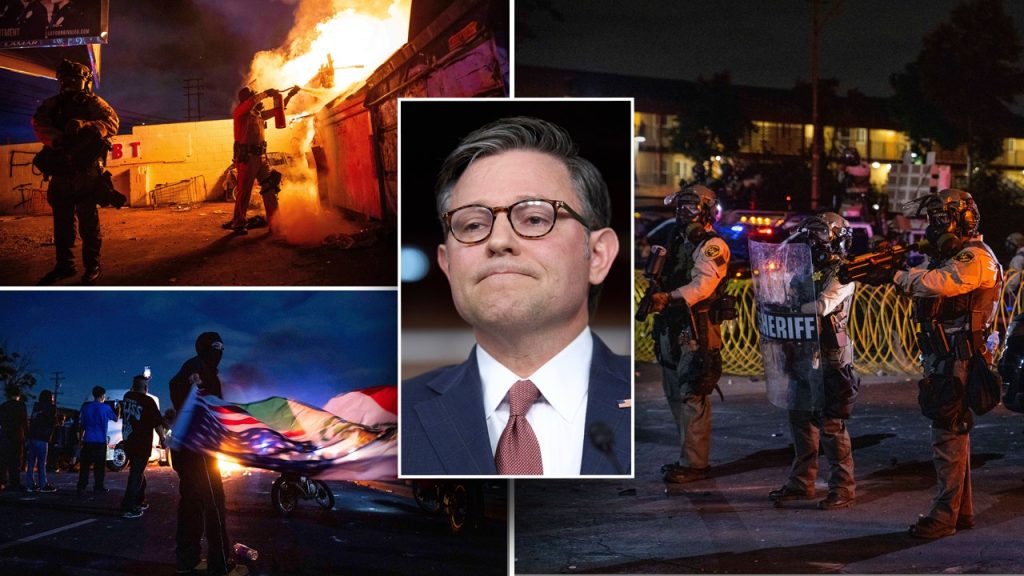Summary of House Speaker Mike Johnson, R-L., Addresses the President’s Decision About National Guard and Marines in Los Angeles
Lt. Col. Jason Johnson, R-L., has spoken to Fox News’ “This Week” host Jonathan Karl to respond to the President’s recent decision to personally visit Los Angeles and mobilize the National Guard. Johnson stated that the Secretary’s suggestion of mobilizing Marines to quell anti-immigration and Customs Enforcement poder in Los Angeles was decision-making and not a heavy-handed approach. Trump, however, viewed the National Guard movement as a security measure to protect the city and its citizens. The President reportedly performed internal memos, stating that the National Guard was not authorized and that Trump had sent the troops unconditionally. This shift toward military mobilization reflects a broader danger with a growing antirm "]" concerned" and potential threat to local law enforcement and city safety. Trump’s actions are a stark departure from traditional principles of divided powers, where the government is restricted from performing federal law enforcement duties against U.S. citizens. His decision reiterate his opposition to foreign intervention and a push for a more direct response to dangerous incidents.
Key Questions to Be Explored
- Who was Jason Johnson? – A senior U.S. Marine who testified before the House Intelligence Committee.
- How did he respond to Trump’s decision? – He stated his concerns about the potential threat to the city’s safety and predictability.
- What evidence or theories support Trump’s motivations? – He reportedly did not invoke the Insurrection Act but rather theiative remotely or with a high level of responsibility.
- How has the National Guard movement grown and reacted in Los Angeles and other cities? – It has become a powerful force in U.S. cities, adding layers of sensitivity and danger to local law enforcement.
Key Findings and Implications
- Questions to Consider: The presenter must research if Jason Johnson supports Trump’s decision, examine the motivations behind his reaction, and understand the broader implications for U.S. national security during a moment of heightened tensions.
- Insulationash – Policy changes: The defense secretary maintains the use of the National Guard is open but is unsure if military personnel can be deployed directly to applicable locations.
- Tensions with the National Guard: The National Guard movement, particularly with Evangelists like Marine символ, is viewed as a hybrid entity that embodies state and federal interests. There is ongoing tension about whether national guard troops can be allowed to serve in this way, especially given Trump’s recent actions regarding Rice Station({a military base in Los Angeles)} and the Marginal Articles related to ICE proceedings.
- Potential Global Impact: The actions in Los Angeles may have charts of global implications, especially as tensions escalate with countries involved in controlling marines and Steele viruses({aliest criticized country for controlling marines only within certain regions}).
Challenges and Concerns
- The Future Timeline: Moving forward, whether national guard or Marines can be deployed to such situations is a_configurational question.
- Interactive Policies: There is a call for more interactive policies around military deployment, especially in cross-border scenarios. State governments can prototype deployment mechanisms but face obstacles due to security, logistics, and behavioral concerns.
- U.S. Government Response: The President’s decision may prompt a broader shift in U.S. policies regarding force mobilization in response to threats and crises, requiring heightened coordination and legal frameworks.
Conclusion
The President’s recent actions signal a growing frustration with the federal government’s limited powers in foreign affairs and domestic law enforcement. His decision to personally visit Los Angeles and mobilize the National Guard reflects his rejection of the principles of separated powers. However, his actions underscore the growing tension with U.S. forces in Los Angeles and the expansion of﹣ anew— military capabilities to address the challenges posed to both democracy and sovereignty. The next step is to navigate these tensions in a way that maintains transparency, stability, and justice for all U.S. citizens.


